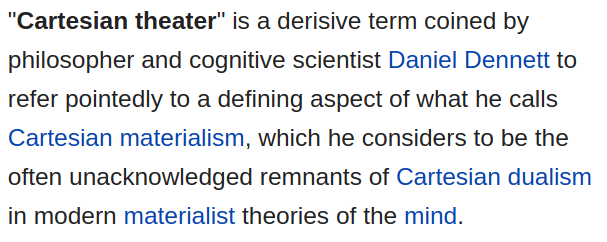🧵 View Thread
🧵 Thread (23 tweets)

broke: "in math we get perfect certainty, but in science the best we can hope for is high probability" leopard: a problems "level of complexity" matters more than if it's formal or empirical, math or science https://t.co/Yx3PQJwlam

i think you're still secretly a Platonist when it comes to the philosophy of math or at least you still have dirty platonist thoughts in your head which i will try to evict (analogous to DD's shtick about the cartesian theatre and dualsim, but with platonism and math) https://t.co/Bbxgj82nzP


WHY am i trying to do this? why does it matter that i evict platos ghost? ...dunno This idea felt HUGE working through it because of how many labels and floating beliefs got smashed around in my head, but i've yet to find a consequence that feels important

we're used to the idea that when it comes to the Real World, you're not guaranteed that you can figure out a given problem less common, but still palatable, is the idea that different empirical problems can have varying levels of difficulty

things that are falsifiable or verifiable form some of the lower tier difficulties. one black swan falsifies the white swan hypothesis. finding those extra particles verifies aspects of super symmetry harder is "what was Louise XVI last thought before dying?"

fun aside, Kevin Kelly (not that one) at CMU has made a dope framework for framing the complexity of inductive empirical problems in terms of topology. he's got an old book on it, and one of his phd peeps did same thing for stats https://t.co/kVTzqSxcFV https://t.co/dlc8sDXMs6

so empirical problems come in various flavors of difficulty/unsolveability turns out, so it is with math. you can go multiple routes, turing or godel, I think it's easier to think about in terms of the halting problem, so lets stick with that.

Halting problem is a concrete example of a math problem about "computers" that just can't be solved. (halting problem is the problem of induction but for computers https://t.co/vNaq5SAa50) above that, there's an inf hierarchy of "even more uncomputable" problems, cuz why not?

though this has already sunk into pop culture, this is relatively new! for most of history, it looks like people thought that if you could put something into math, all formal question you can ask would be answerable math = simple/totally understandably ^ not quite true

so that's the upwards direction. both formal and empirical domains have problems of increasingly difficult complexity what about the downards direction? surely 1 + 1 = 2 is more sacred than any profane empirical facts? lol nah.

"math nerds prove things right? they can even completely formalize the notion of proof, and have machines verify proofs, can't they? you can't do that with the real world!" yes yes sorta common refrain, since math is about "abstract entities" things are nice and pretty...

u: numbers are "abstract entities" and thus you've got none of the yucky *nebulosity* in the real world me: wait, so you think numbers aren't part of the real world? u: um... well no, but.... they're different than other things... me: i smell plato 😡 https://t.co/wK3VWd0hE8

me: "abstract objects" are when you're brain is representing some *concrete irl thing* that is simple enough that we can all agree on how/when to ignore the nebulosity around them https://t.co/R5S2TNYrqp

we ignore nebulosity all the time (for good and bad) talking about abstract objects means you've already apriori decided to ignore nebulosity when you fuck up addition, you don't consider that a refutation of math, because it's easy to tell when you've messed up

because math (even advanced math) is actually pretty simple, it's something you can do in your head or on paper, and do it again and again, and robustly see the same results. thought there is nebulosity (cosmic rays, u drunk) , it's a lot less than in some other domains

another framing: you "know for certain" a mathy thing is true when you see a proof, or when you run a proof through a theorem prover both of these processes are susceptible to whatever bullshit demons/hallucinations you want to postulate (same as everything else)

btw I feel GREEEEEEEEEEAT about ignoring the nebulosity surrounding what i've done with my mind to believe 1 + 1 = 2 fuck cosmic rays, i bank on the lack of hallucinations 24/7/365 i'm not tryna convince you math is weak. just that it's not of a SPECIAL PLATONIC TYPE

(og inspiration for all this was this book. it explores what people actually do in their heads when doing math. fun shit. funny, it took me two reads to go from "they seem to have an obviously dumb thesis" to "ooooooooooh shit, yeah, i feel you dog") https://t.co/MlfAFmvcsh

crux of my whole arg is my notion of what is going on in our heads when we think of what we call "abstract objects", and the implicit agreement to ignore, which is easy given the low nebulosity environment of symbols on paper and thoughts in heads https://t.co/L0gPLkL3wx